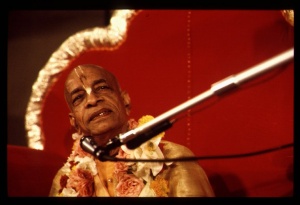SB 4.28.31

A.C. Bhaktivedanta Swami Prabhupada
TEXT 31
- ekaikasyābhavat teṣāṁ
- rājann arbudam arbudam
- bhokṣyate yad-vaṁśa-dharair
- mahī manvantaraṁ param
SYNONYMS
eka-ekasya — of each one; abhavat — there became; teṣām — of them; rājan — O King; arbudam — ten million; arbudam — ten million; bhokṣyate — is ruled; yat — whose; vaṁśa-dharaiḥ — by descendants; mahī — the whole world; manu-antaram — up to the end of one Manu; param — and afterward.
TRANSLATION
My dear King Prācīnabarhiṣat, the sons of Malayadhvaja gave birth to many thousands and thousands of sons, and all of these have been protecting the entire world up to the end of one Manu's life-span and even afterward.
PURPORT
There are fourteen Manus in one day of Brahmā. A manvantara, the life-span of one Manu, is given as 71 multiplied by 4,320,000 years. After one such Manu passes on, another Manu begins his life-span. In this way the life cycle of the universe is going on. As one Manu follows another, the cult of Kṛṣṇa consciousness is being imparted, as confirmed in Bhagavad-gītā (BG 4.1):
- śrī-bhagavān uvāca
- imaṁ vivasvate yogaṁ
- proktavān aham avyayam
- vivasvān manave prāha
- manur ikṣvākave 'bravīt
"The Blessed Lord said: I instructed this imperishable science of yoga to the sun-god, Vivasvān, and Vivasvān instructed it to Manu, the father of mankind, and Manu in turn instructed it to Ikṣvāku." Vivasvān, the sun-god, imparted Bhagavad-gītā to one Manu, and this Manu imparted it to his son, who imparted it to yet another Manu. In this way the propagation of Kṛṣṇa consciousness is never stopped. No one should think that this Kṛṣṇa consciousness movement is a new movement. As confirmed by Bhagavad-gītā and Śrīmad-Bhāgavatam, it is a very, very old movement, for it has been passing down from one Manu to another.
Among Vaiṣṇavas there may be some difference of opinion due to everyone's personal identity, but despite all personal differences, the cult of Kṛṣṇa consciousness must go on. We can see that under the instructions of Śrīla Bhaktivinoda Ṭhākura, Śrīla Bhaktisiddhānta Sarasvatī Gosvāmī Mahārāja began preaching the Kṛṣṇa consciousness movement in an organized way within the past hundred years. The disciples of Śrīla Bhaktisiddhānta Sarasvatī Gosvāmī Mahārāja are all Godbrothers, and although there are some differences of opinion, and although we are not acting conjointly, every one of us is spreading this Kṛṣṇa consciousness movement according to his own capacity and producing many disciples to spread it all over the world. As far as we are concerned, we have already started the International Society for Krishna Consciousness, and many thousands of Europeans and Americans have joined this movement. Indeed, it is spreading like wildfire. The cult of Kṛṣṇa consciousness, based on the nine principles of devotional service (śravaṇaṁ kīrtanaṁ viṣṇoḥ smaraṇaṁ pāda-sevanam/ arcanaṁ vandanaṁ dāsyaṁ sakhyam ātma-nivedanam (SB 7.5.23)), will never be stopped. It will go on without distinction of caste, creed, color or country. No one can check it.
The word bhokṣyate is very important in this verse. Just as a king gives protection to his citizens, these devotees, following the principles of devotional service, will give protection to all the people of the world. The people of the world are very much harassed by so-called religious-principled svāmīs, yogīs, karmīs and jñānīs, but none of these can show the right way to become elevated to the spiritual platform. There are primarily four parties spreading devotional service all over the universe. These are the Rāmānuja-sampradāya, the Madhva-sampradāya, the Viṣṇu Svāmī-sampradāya and the Nimbārka-sampradāya. The Madhva-Gauḍīya-sampradāya in particular comes from Lord Caitanya Mahāprabhu. All these devotees are spreading this Kṛṣṇa consciousness movement very widely and giving protection to innocent people who are being so much embarrassed by pseudo-avatāras, -svāmīs, -yogīs and others.